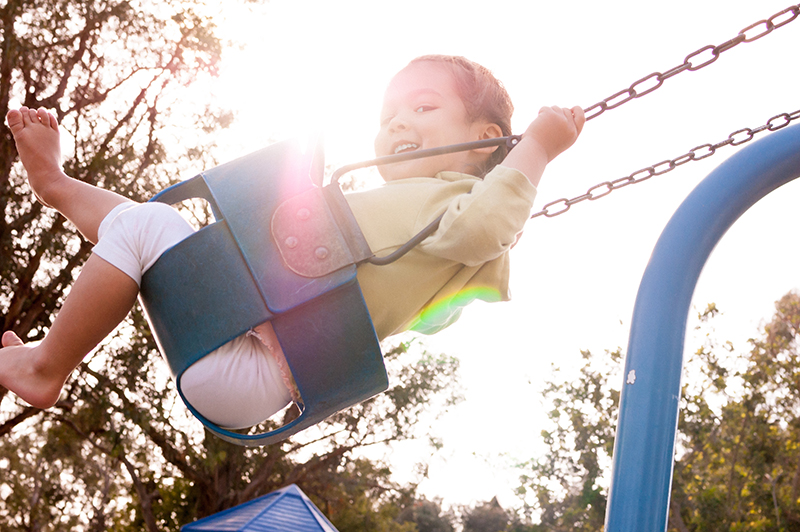Families For Life | 101 Tips (5-6 Years)

1. Be positive. If you are generally an optimistic and positive person, your kids will learn to adopt this (happier!) attitude to life.
2. Go back to school. Community centres and non-profit organisations often have parenting talks and courses.
3. Remember that no one is perfect, so try not to compare your child with other children. Every parent parents differently, and every child is unique.
4. Accept your child. As your child grows, he will display certain personality traits. Respect your child’s developing individuality and don't expect him to be just like you.
5. Nurture your child's personality. Find ways to help him feel confident, and build on his strengths.
6. Be there. For children, quality time IS quantity time. They like to know that you are there with them.
7. Give them your attention. Listen wholly to them when they want to talk to you, instead of listening with one ear while you are doing something else.
8. Know their world. Teachers, caregivers, doctors — all of them are an important part of your and your child's lives.
9. Teach them to tell the time. Together, craft a paper plate clock with moving hands. Let your child decorate the clock face, then teach him how to use it.
10. Make healthy eating fun. Freeze smoothies into lollies for them to suck on a hot afternoon or after playground time.
11. If greens are still a no-no, sneak them into meals. Blend organic spinach into spaghetti sauce and kids won’t be able to tell the difference!
12. Let them sort out their own problems. When young children argue, don't step in immediately. Give them a chance to sort it out for themselves.
13. Let them be children. Let them do silly things and have fun.
14. Give your older child lots of physical attention. They still love hugs, cuddles and holding hands.
15. Celebrate! Kids love a celebration and you can turn anything into one: the first day of a month, dropping a tooth, seeing a rainbow, anything!
16. Let them carry their own ‘bag of tricks’ when you go out. Apart from a water bottle, this can hold a notebook and pencils (to sketch or write what they see), or a book to read.
17. Get them to send themselves a postcard each time you go on holiday. Even when the holiday is over, they’ll still have something to look forward to from that time!
18. Teach them to save for themselves as well as others. Whatever allowance they get can be split into these categories: To save, to spend, to give. No need to buy piggy banks either, just recycle tart and cookie containers from cake shops.
19. For aviation fanatics with imagination, mum’s eye masks and beanie hats make excellent pilot helmet and goggles combos.
20. Invest in a timer. Kids can listen out for the buzzer if they don't want to hear mum say (again): “Time to pack up your toys and go to sleep!"
21. Encourage them to write by crafting an in-house mailbox together. You can leave notes to each other in it.
22. Teach him about his neighbourhood by drawing a map of the area you live in, and taking a walk around with it. He can mark out his favourite places, where his friends live, and so on.
23. Get him traffic-savvy by asking him to let you know when it is safe for both of you to cross the road together.
24. Have a parent-child date once a week, just the two of you. Kids love this special time with you, and the fact that they — and only they themselves — have your full attention.
25. Make him a role model to his younger sibling. He'll learn responsibility, take pride in his ability, and strive to do everything well.
26. When it comes to potty talk, go with the flow. Kids (especially boys) get a huge thrill out of it. Don’t worry, it’s just a phase, and they will eventually grow out of it.
27. They’re starting to get really curious about you and what life was like for you as a child. Bring them on a heritage tour of Singapore, starting with your childhood 'kampong'.
28. Expose them to the arts. Most museums in Singapore offer free entry to citizens. Take advantage of free symphony performances at the parks. Attend festival-based events at the Esplanade and other arts venues.
29. Steep them in nature. Make conscious decisions to visit parks, nature reserves, forests, and beaches. As Richard Louv, author of Last Child In The Woods has found, direct exposure to nature is essential for healthy childhood development and physical and emotional health.
30. See the funny side of things and keep your sense of humour alive. It’s vital when you have to deal with kids of this age as they can now reason, negotiate, and find loopholes in your arguments.
31. At this age, kids have great imaginations and no qualms about expressing themselves. Encourage your child to tell you a story about the drawing that he has just done, or do a mini-review of the book that he has just read. Make video keepsakes of these. These are not just wonderful memories for when he grows up – all this is great starting practice for show-and-tell sessions in school!
Explore more
Contributed by:
Early Childhood Development Agency